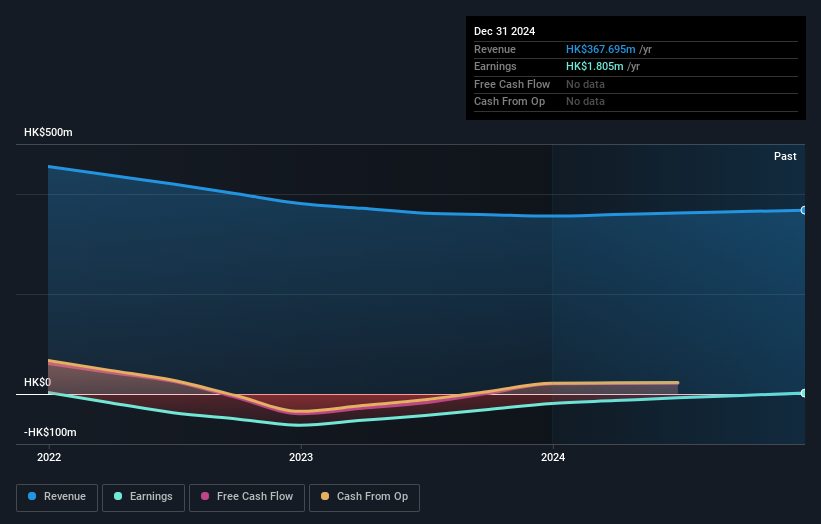
Key Insights
- Significant control over Steve Leung Design Group by private companies implies that the general public has more power to influence management and governance-related decisions
- 52% of the company is held by a single shareholder (Eagle Vision Development Limited)
- 32% of Steve Leung Design Group is held by insiders
A look at the shareholders of Steve Leung Design Group Limited (HKG:2262) can tell us which group is most powerful. And the group that holds the biggest piece of the pie are private companies with 52% ownership. Put another way, the group faces the maximum upside potential (or downside risk).
Private companies gained the most after market cap touched HK$890m last week, while insiders who own 32% also benefitted.
In the chart below, we zoom in on the different ownership groups of Steve Leung Design Group.
View our latest analysis for Steve Leung Design Group

What Does The Lack Of Institutional Ownership Tell Us About Steve Leung Design Group?
Institutional investors often avoid companies that are too small, too illiquid or too risky for their tastes. But it's unusual to see larger companies without any institutional investors.
There are multiple explanations for why institutions don't own a stock. The most common is that the company is too small relative to funds under management, so the institution does not bother to look closely at the company. Alternatively, there might be something about the company that has kept institutional investors away. Steve Leung Design Group might not have the sort of past performance institutions are looking for, or perhaps they simply have not studied the business closely.

Steve Leung Design Group is not owned by hedge funds. Eagle Vision Development Limited is currently the company's largest shareholder with 52% of shares outstanding. This essentially means that they have extensive influence, if not outright control, over the future of the corporation. With 22% and 9.9% of the shares outstanding respectively, Chi-Tien Leung and Yaohua He are the second and third largest shareholders. Chi-Tien Leung, who is the second-largest shareholder, also happens to hold the title of Top Key Executive.
While it makes sense to study institutional ownership data for a company, it also makes sense to study analyst sentiments to know which way the wind is blowing. Our information suggests that there isn't any analyst coverage of the stock, so it is probably little known.
Insider Ownership Of Steve Leung Design Group
The definition of an insider can differ slightly between different countries, but members of the board of directors always count. Management ultimately answers to the board. However, it is not uncommon for managers to be executive board members, especially if they are a founder or the CEO.
Most consider insider ownership a positive because it can indicate the board is well aligned with other shareholders. However, on some occasions too much power is concentrated within this group.
It seems insiders own a significant proportion of Steve Leung Design Group Limited. Insiders have a HK$289m stake in this HK$890m business. We would say this shows alignment with shareholders, but it is worth noting that the company is still quite small; some insiders may have founded the business. You can click here to see if those insiders have been buying or selling.
General Public Ownership
With a 15% ownership, the general public, mostly comprising of individual investors, have some degree of sway over Steve Leung Design Group. This size of ownership, while considerable, may not be enough to change company policy if the decision is not in sync with other large shareholders.
Private Company Ownership
Our data indicates that Private Companies hold 52%, of the company's shares. It might be worth looking deeper into this. If related parties, such as insiders, have an interest in one of these private companies, that should be disclosed in the annual report. Private companies may also have a strategic interest in the company.
Next Steps:
While it is well worth considering the different groups that own a company, there are other factors that are even more important. For example, we've discovered 1 warning sign for Steve Leung Design Group that you should be aware of before investing here.
Of course, you might find a fantastic investment by looking elsewhere. So take a peek at this free list of interesting companies.
NB: Figures in this article are calculated using data from the last twelve months, which refer to the 12-month period ending on the last date of the month the financial statement is dated. This may not be consistent with full year annual report figures.
Have feedback on this article? Concerned about the content? Get in touch with us directly. Alternatively, email editorial-team (at) simplywallst.com.
This article by Simply Wall St is general in nature. We provide commentary based on historical data and analyst forecasts only using an unbiased methodology and our articles are not intended to be financial advice. It does not constitute a recommendation to buy or sell any stock, and does not take account of your objectives, or your financial situation. We aim to bring you long-term focused analysis driven by fundamental data. Note that our analysis may not factor in the latest price-sensitive company announcements or qualitative material. Simply Wall St has no position in any stocks mentioned.